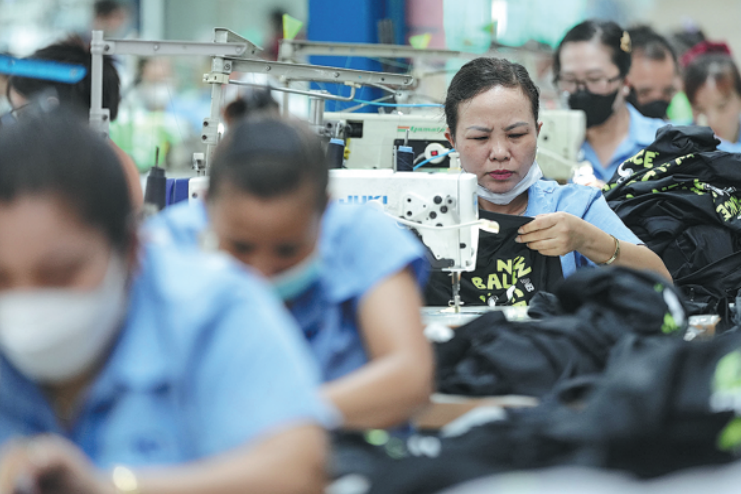Policies tackle surging youth unemployment
By CHENG SI | China Daily | Updated: 2023-07-12 08:46

Rise in joblessness among under-24s due to changing international landscape, pandemic, and cyclical factors
China has been working hard to stabilize the job market, prioritizing employment for young people, many of whom are struggling as a result of rising unemployment created by economic uncertainty and the increase in the number of college graduates.
Together with the Ministry of Education and the Ministry of Finance, the Ministry of Human Resources and Social Security recently released a policy designed to encourage employers to hire fresh college graduates and the registered unemployed youth through the promise of a special allowance.
Under the policy, employers willing to sign contracts with either unemployed college students who have graduated within the past two years or young, registered jobless workers age between 16 and 24, will receive a one-time 1,500 yuan ($207) allowance for each young person they hire until the end of December.
Employers must make certain payments, such as pension and workmen's compensation insurance, to newly-hired workers for at least a month before applying for the allowance.
Additionally, human resource bureaus have been asked to streamline administrative procedures for reviewing applications for the allowance, and should pay employers within 30 days of verifying eligibility.
Supervision of the issue and use of the special employment allowance is to be stepped up, and provincial human resources departments are required to report the amounts they have paid out to the Ministry of Human Resources and Social Security each month to prevent fraud.
This is just one of a number of policies designed to invigorate the job market as a whole, especially when it comes to the employment of those aged between 16 and 24, and requires governmental vigilance. The unemployment rate among this demographic rose to 20.8 percent in May, up from 20.4 percent in April, and an increase of 2.4 percentage points year-on-year, according to the National Bureau of Statistics.
The NBS said that as of May, there were around 96 million people aged between 16 and 24, 33 million of whom have finished education and entered the job market. "Among these 33 million, about six million are still looking for work," NBS spokesman Fu Linghui told a recent news conference.
The human resources ministry began to launch a series of policies to encourage the employment of young people early last month to coincide with the annual graduation period. The number of new college graduates reached 11.58 million this year, an increase of 1.67 million on last year.
The ministry kicked off a 100-day campaign on June 6 to find 10 million jobs for college graduates and jobseekers. Another employment campaign launched by the ministry that has been underway since late June aims to help college graduates and registered unemployed youth find as many jobs as possible in the five-month period until the end of December.
This latter campaign gives unemployed graduates one employment policy introduction, one career guidance session, three job recommendations and a skill training course or internship. In addition, customized job services will be available to young people who have been out of work for a significant period of time, to further invigorate the job market.
Mao Yufei, an associate professor at the School of Labor Economics at the Capital University of Economics and Business, said that there is a disparity between the increasing number of college graduates and decreasing demand for them from employers, and that the country has entered a critical period during which company confidence needs to be boosted and people encouraged to spend more to relieve downward economic pressure, which is one of the factors limiting demand from employers.
He said that teachers and government officials should encourage college students who remain unemployed because they haven't received a satisfactory job offer, by providing them with a clear analysis of the current job market, as well as the pros and cons of having a job.
"There are some students with the will to work who are making every effort to find a job but have failed to do so because they lack work experience or skills. Colleges should encourage these students to accept internships to improve their skills. We should also show due respect and understanding for another group of students who are preparing to take the civil servant examinations, and who are missing out on job opportunities and the job-seeking season," he added.
Pang Shi, director of the Chinese Academy of Personnel Science's department of employment and entrepreneurship said that the high youth unemployment rate must be viewed objectively.
"We should face up to the rising youth unemployment rate, which is a result of greater numbers, as well as the problems arising from the influence of cyclical unemployment, structural unemployment and frictional unemployment. Youth employment is a common global problem. It's not unusual to see a higher youth unemployment rate, which is sometimes two or three times the national average, in other countries and regions," she said.
"The youth employment problem has deepened in recent years as the result of changes to the international landscape, the pandemic, and industrial changes and adjustments. A recent report by the International Labor Organization said that the global youth unemployment level reached 73 million last year, a rise of six million from 2019, before COVID-19 hit."
Pang added that the youth employment problem is the result of economic cycles, the imbalance between supply and demand between the youth labor force and the market, and also results from the career outlooks of the young.
"The fundamental way to solve the youth employment problem is to develop the economy and create more stable job opportunities, and to ensure that jobseekers match with job vacancies. The large number of private companies are an important means of stabilizing the national economy, and are also the country's main employers. So the government can encourage private companies to create job opportunities by offering them preferential policies and reducing information asymmetry between companies and college students to better connect both sides," Pang added.
chengsi@chinadaily.com.cn
























